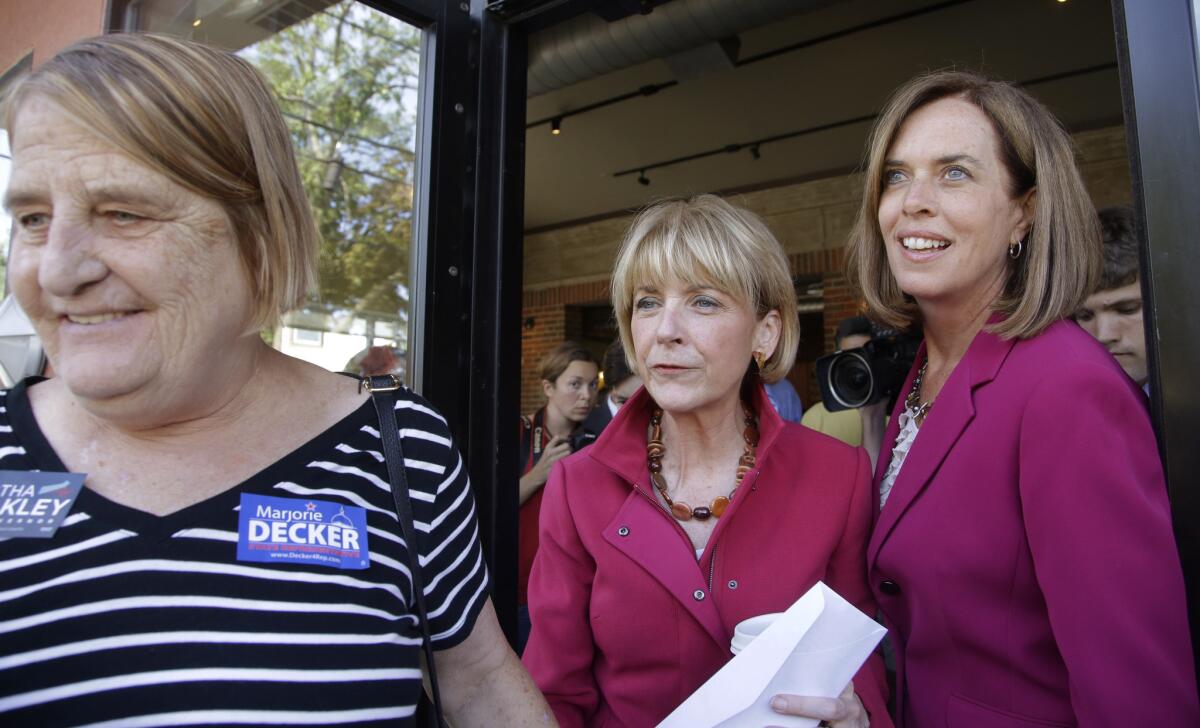Coakley could lead Massachusetts ballot of female candidates

- Share via
Reporting from Boston — If Martha Coakley wins the Democratic primary for governor today, she’ll be poised to try to redeem herself after an embarrassing defeat in 2010.
She’ll also be setting the stage for a November election that could feature women in some of the top slots on the ballot in Massachusetts, part of a trend in which women are increasingly winning statewide elections across the country.
Pre-primary polls from the Boston Globe and the NPR station WBUR show Coakley far ahead of other Democrats running for governor. She was trailed by Steve Grossman, the state treasurer and former national party chairman who was endorsed by the Boston Globe and the state party but failed to gain traction, and Don Berwick, the former administrator of the Centers for Medicare and Medicaid Services, who ran mostly on healthcare issues.
Separately, a recent poll showed Maura Healey, a Democrat running for Massachusetts attorney general, surging in her race against former state legislator Warren Tolman. Healey is openly gay and led one of the first successful lawsuits against the Defense of Marriage Act.
In 2012, the state’s junior senator, Elizabeth Warren, became the first woman to be elected U.S. senator from the state; she has been a big draw among party liberals since then, prompting some supporters to pressure her to run for president. (She has said she backs Hillary Rodham Clinton.)
“There really is a story here about the strength of women in the Massachusetts Democratic party,” said Jeffrey M. Berry, a professor of political science at Tufts University. “There’s a lot of movement that is powered by activist women, and young women.”
In that, Massachusetts has some catching up to do. In the 2012 elections, New Hampshire voters sent an all-female delegation to Washington; the state’s governor is also female. Wisconsin, North Dakota, Nebraska and Hawaii also elected female U.S. senators in 2012; California has been represented by two female senators since 1992.
Though Warren broke the federal glass ceiling in 2012, Massachusetts has never elected a female governor.
One of Coakley’s supporters is Charlene Smith, an author who lives in Cambridge, Mass. Smith said she supports Coakley because she’s gone after corruption in financial institutions, but also because of her track record on women’s issues. Coakley testified before the legislature in support of a law that would create buffer zones around abortion clinics; the law passed in 2007 but was struck down by the Supreme Court this year.
Coakley has been widely derided by many in the Democratic establishment for losing a 2010 special election against Republican Scott Brown for the seat held by Edward M. Kennedy until his death. That election was marked by gaffes on Coakley’s part and Brown’s man-of-the-people campaigning.
But her resiliency appeals to voters, said Berry.
“There’s a different narrative this time that is helping her, and that’s one of redemption,” he said. “Her grit in going back to work after her humiliating defeat, being a strong attorney general, not complaining or whining about her defeat, helps her.”
That’s one of the things that appeals to Smith, the voter.
“I believe she’s learned from those mistakes,” she said. “She’s had the humility to admit that she messed up.”
By coincidence, the man who defeated Coakley is a candidate for the U.S. Senate in today’s primary in New Hampshire. (He moved to his vacation home there after his 2012 defeat at the hands of Warren.)
If she wins, Coakley will probably face Charlie Baker, the front-runner in the Republican primary, who has also been defeated in the past. Baker ran against incumbent Deval Patrick in the 2010 race for Massachusetts governor, and lost. But Baker will be at a disadvantage in the November elections; only 11% of voters in Massachusetts are registered Republicans, while 35% are Democrats.
Twitter: @AlanaSemuels
More to Read
Sign up for Essential California
The most important California stories and recommendations in your inbox every morning.
You may occasionally receive promotional content from the Los Angeles Times.














